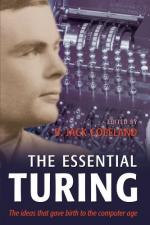|
This section contains 1,212 words (approx. 5 pages at 300 words per page) |

|
Alan Mathison Turing was born June 23, 1912, in London and died June 7, 1954, at his home near Manchester. He suffered the conventional schooling of the English upper-middle class, but defeated convention by becoming a shy, eccentric but athletic Cambridge mathematician. The Second World War transformed Turing's life by giving him a crucial role in breaking German ciphers, with particular responsibility for the Atlantic war. Thereafter Turing led the design of electronic computers and the program of artificial intelligence. In 1950 he began another career as a mathematical biologist, but was assailed by prosecution for homosexuality. His last two years, though overshadowed by punishment and security risk status, saw vigorous and defiant work until his death by cyanide poisoning.
Turing's paper Computing Machinery and Intelligence appeared in 1950. This, his only contribution to a philosophical journal, was to become one of the most cited. He considered the...
|
This section contains 1,212 words (approx. 5 pages at 300 words per page) |

|


